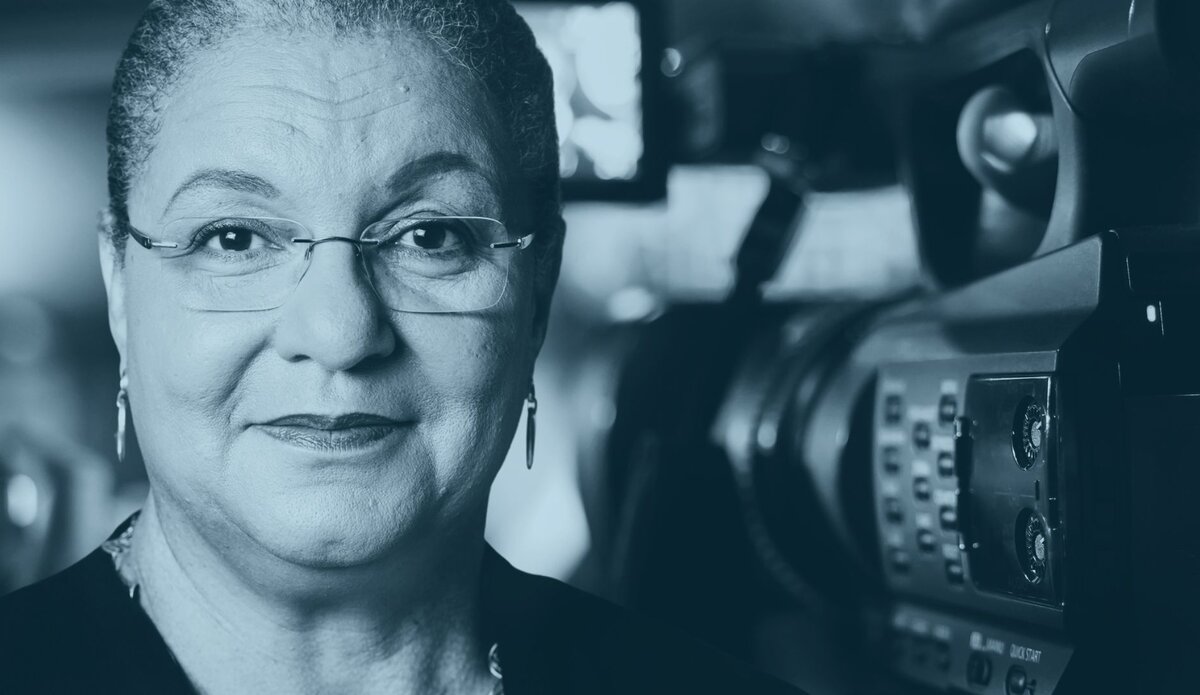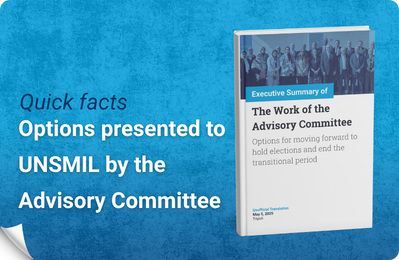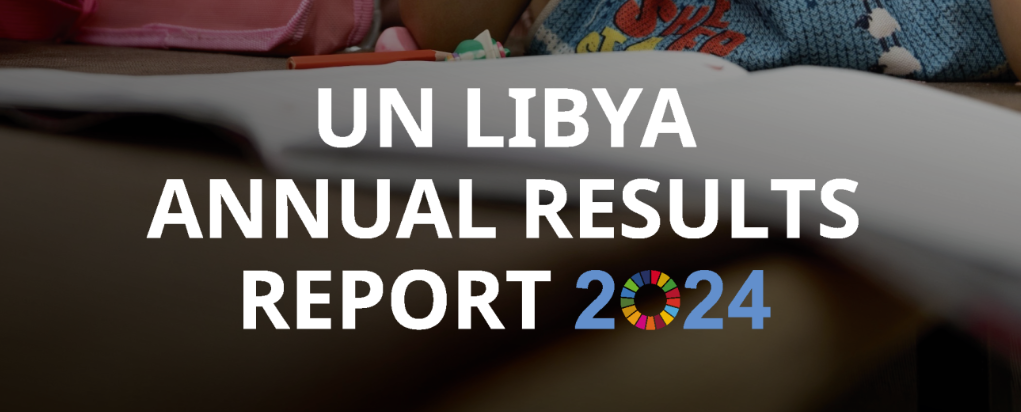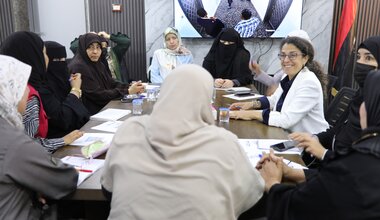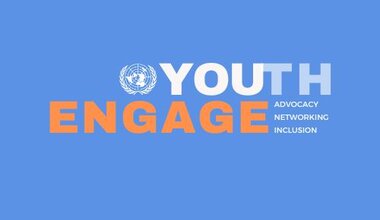Transcript: SRSG Hanna Tettah’s interview with Al Hadath on 22 May 2025
Al Hadath
It is a pleasure to have Hanna Tetteh, Special Representative of the Secretary-General for Libya and Head of the United Nations Support Mission in Libya (UNSMIL). Ms. Tetteh, welcome to the program on Al Hadath. This is the first time you are speaking to us for more insights about the Libyan issue and the role of the UN. You are working in Tripoli, which has witnessed clashes, the killing of an armed group leader, demonstrations, and shootings. What are your comments about the current developments and the latest situation in Tripoli?
SRSG Hanna Tetteh
Well, as you said, last week there was the killing of the head of the SSA, the Security Support Apparatus, Mr. Al Kikli, and it gave rise to tensions and violence. The following day there was fighting between armed groups for around 8 to 10 hours, and then there was intervention by other armed group leaders and, I believe, officials of the GNU to try to calm things down. Consequently, over the last week, we have not seen a resumption of violence, though there have been tensions.
The UN, right from the onset, was issuing statements emphasizing the need to bring an end to the violence, to protect civilians, to make sure that there was no escalation of the conflict, and to also to say that there would be accountability for those who behaved in criminal ways and did not respect human rights and the protection of civilians.
Further to that, we also worked with the Presidency Council to establish the Truce Committee, which has since met twice. The Truce Committee is made up of senior leaders of the Libyan armed forces who were not part of these violent battles, but who are able to intervene, work with other actors, deescalate, deconflict, and reduce tensions.
What we've seen over the last week is a reduction in tensions between the armed groups. But there have been demonstrations and civil unrest. We understand that there are going to be demonstrations tomorrow. We're not in a position to assess the extent, except that they have been widely publicized. If people do participate as indicated online, it could be similar to last week's demonstrations.
We continue to emphasize that the right to demonstrate is a human right. It is a right that should be available to all citizens if they are unhappy with the way things are being run. They should not be met with violence if no violent acts occur during the demonstration. Even if there are disturbances, any response must be proportional and aim to protect lives and property.
We're in a situation where we hope there will not be a renewed escalation of conflict. All the work that we've been doing—my colleagues here at UNSMIL—reaching out to different actors, supporting the Truce Committee, and engaging with government authorities in Tripoli has been aimed at avoiding that.
Al Hadath
Ms. Hanna Tetteh, could you please briefly tell us, as we want to really use this time to discuss many issues in Libya, particularly regarding the right to demonstrate: You have expressed concern about reports of civilians being killed in Tripoli or elsewhere. Have you reached out to anyone in Tripoli to help protect demonstrators tomorrow?
SRSG Hanna Tetteh
Well, as you know, the UN and UNSMIL make our positions known through official statements and then we reach out to actors—when we say actors, we mean government actors—to encourage their respect for the protection of civilians.
I just mentioned to you that we supported the Presidency Council to establish the Truce Committee. The Truce Committee was established to prevent further escalation of conflict between armed actors, but also to engage them and to insist that when there is a civilian demonstration—provided it is non-violent, does not seek to harm others, or destroy public property—that right to protest should be respected. We have made this point several times.
Al Hadath
It is worth noting, Ms. Tetteh, that you have published options to overcome the situation, comprising four proposals mainly linked to elections. Do you see the situation in Libya as favourable for holding elections?
SRSG Hanna Tetteh
Well, Libya is not favourable for holding elections tomorrow, right? But the whole idea of a political process is to build consensus and ensure that the necessary mechanisms are in place to allow for free and credible elections.
What you are referring to are the proposals of the Advisory Committee. The Advisory Committee is made up of 20 Libyan legal and constitutional experts who understand election-related matters and who were asked to provide UNSMIL with advice on how the current challenges in the electoral framework could be addressed to ensure that the next time, if there was an effort to hold elections, those elections could continue without being further postponed.
They looked at the electoral laws. They looked at the electoral management body and how they had carried out their functions. They looked at what could be possible options for holding elections. The four options they agreed upon were as follows:
Firstly, that there could be presidential and parliamentary elections. That's one. Or, two, there could be parliamentary elections that would, thereafter, have the members of Parliament considering a new constitution for Libya as a country, and once that constitution was adopted, then lead to presidential elections. Or three, there could be--instead of presidential and parliamentary elections or just parliamentary elections—there could rather be the focus on developing a constitution and then after that going towards elections. And if none of those options were preferred by the Libyan people, then the suggestion was to invoke an Article 64 process and start a new Libyan dialogue.
Look, these are all possibilities. When we shared the Advisory Committee’s report with the public—which we have now done—the reason was to gather feedback from the public. After all, if this proposal is to be considered by Libyans, they should have the opportunity to look through it and let us know what they think.
Apart from that, we are engaging a series of meetings in cities across the country where we will be seeking to get feedback from the Libyan people on these options. We want to know what they consider the most effective way to provide a strong governance framework, allowing for the participation of all people who qualify to vote for their leadership—which, by definition, will give any new leader a strong mandate. Beyond that, what do they consider the best way to ensure that there is an elected government that understands that its responsibility is to the people who elected it.
It's not something that can be done overnight. There are a number of things that need to be done in order to get to that outcome, but first and foremost, the choice has to be made as to what path the people want to take. And once that choice has been made, we can work towards it.
Al Hadath
Ms. Hanna Tetteh, you mentioned the options. When do you and the Libyan parties expect to agree on an election roadmap? And who are those who decide on this roadmap? The parliament, the Dbeibah government the Hammad government—who are the decision-makers?
SRSG Hanna Tetteh
All stakeholders. The reason we have put this out in publicly and invited comment is to allow as many Libyans as possible who want to state their opinion to do so. What we are doing in our engagements is listening to people, paying attention to what they say. We are getting a sense of what—because we visited two cities, Zintan and Misrata, and we will continue—they consider to be the most viable options. If you ask who is going to decide—this process of consultation will help us to understand where the preference of public opinion lies.
We have also asked for feedback from the Government of National Unity. We've asked for feedback from the Presidency Council. We've asked for feedback from the House of Representatives, and we've also asked for feedback from the LNA.
We intend to use all of this feedback to determine the general consensus around a roadmap and, then, what we will do is that we will put those ideas together and present it to the Libyan people and then to the Security Council as the roadmap for the way forward.
Now when you ask within what time frame—in the Advisory Committee’s report they were of the view that all of this could be done within six months. Of course, if we could do it faster, it would be even better, but for now we're in the consultation phase and that is what is ongoing.
Al Hadath
Two final questions, Ms. Hanna Tetteh, if you could be brief, please. First, regarding the divide between East and West, we know the situation between the governments is complicated. What is your position regarding the competition between the Presidency Council and the House of Representatives in choosing a new president or seeking an alternative to the Dbeibah government?
SRSG Hanna Tetteh
Well, let's get something clear. I am not here in a personal capacity. I am here as the Head of UNSMIL, the United Nations Support Mission in Libya. Any position taken by the Mission is informed by consultations with colleagues who have been in the country—some of them have been in this country for awhile— and have watched developments, over the years, as they have unfolded. They are in a position, therefore, to make an assessment about what has worked and what hasn't.
The House of Representatives has on two occasions tried to establish a new government aside from the Government of National Unity. It appears that process of trying to establish a new government has not had overall acceptance. Therefore, it's important that any new initiatives by any actors should not be done in a unilateral manner. If previous experience is anything to go by, it is not likely to be successful.
That's the reason why we believe that it's important to have consultations on the way forward and arrive at an outcome that is consensus and can be accepted, once again, by the majority of Libyans.
For now, the international community still recognizes the Government of National Unity, but we recognize that the Government of National Unity is receiving protests and pushback from citizens, especially here within western Libya and within Tripoli.
So, is this an ideal situation? No. Is it the case that the original mandate, which the Government of National Unity was expected to last has expired? Yes. Is it the case that what you refer to as the Hammad government in the East does not have complete recognition? Yes. And continuing down this path is only going to continue to divide Libya.
If we want a solution that unites instead of divides, then I think it's important to have a process of consultation, develop a consensus and agree on the way forward. I don't think unilateral actions by any actor are particularly helpful in this regard.
Al Hadath
Dialogue between the Presidency Council in the West and the House of Representatives in the East to select a new government—but from your side, what...
SRSG Hanna Tetteh
No, no, no. Hold on. That’s not what I said. Please listen to me carefully. The House of Representatives, as I understand it, has a process it must respect to select a Prime Minister. It’s not just a matter of dialogue. That process also involves the High Council of State, which is currently divided. That process, if properly engaged, would have a leader that would be accepted by the majority, which means it has to be transparent.
I'm aware that, indeed, there have been some indications of engagement between the House of Representatives and the Presidency Council. I'm not stating an opinion on that because I'm not privy to what it is that they have discussed.
But what I do know is that a process has already been established and anything that seeks to change a government should reflect processes that have already been agreed. If there's no respect for laws and there's no respect for process, then any new government will lack legitimacy. I hope I've made myself clear.
Al Hadath
It's very clear. Thank you so much indeed for your time and for clarifying the situation in Tripoli and in Libya, Hanna Tetteh, UN Special Representative of the Secretary-General in Libya, and head of the United Nations Support Mission in Libya. Thank you.
SRSG Hanna Tetteh
Thank you so much. And thank you to your audience for listening.
 United Nations Peacekeeping
United Nations Peacekeeping UN
UN
